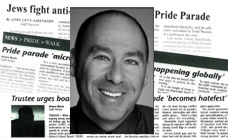By Martin Gladstone
I had the honour last week of sitting down and talking with Nobel laureate Elie Wiesel and Sir Salman Rushdie, both very strong, eloquent advocates for free speech. They shared how words and language can also be used to spread hate and intolerance, hence the horrors of the holocaust, or the horror of living under a fatwa. It was opportune as I reflected on the debate in our gay community regarding censorship.
My film, Reclaiming our Pride, challenged the messaging of the group Queers Against Israeli Apartheid (QuAIA) in Toronto’s gay Pride parade. In past years, messages demonizing the Pope were reportedly removed from the parade.

Following precedent, Pride Toronto has banned the term “Israeli apartheid” from the parade. Some feel this is arbitrary censorship, an attack on QuAIA members’ right to unbridled free speech and a betrayal of the political roots of pride. But the real issue is compliance, not censorship.
Pride Toronto accepts public money to make our celebration possible. With that acceptance comes responsibility and accountability for its terms of funding. With all respect to the pioneers of pride, the pride celebration of 2010 is not the pride celebration of 1981. The pride of 1981 had no legal charter, no sponsors, no stakeholders to help finance and pay the bills, and no accountability requirements. It was not affected by charity law and rules governing not-for-profit corporations. There was no city declaration of non-discrimination to abide and honour.
It did not yet need street permits, insurance, security, barriers, cleanup crews, or even potties. But the small Pride parade of 1981 has gone with the wind. Pride today is a public mainstream event for a large broad-based community from all walks of life to celebrate our gay community in a spirit of inclusion and tolerance.
As our community grew, Pride became a not-for-profit corporation in order to minimize liability and gain access to grants, public money and tax exemptions. Pride’s legal charter is to celebrate gay rights, not to demonize Israel, or any other group. Pride should not enjoy the benefits of its not-for-profit status, and prospective charitable status, without complying with its legal responsibilities. And the inclusion of groups that brand Israel an apartheid state has little to do with the celebration of gay pride, except in anti-logical arguments that most reasonable people reject.
Virtually all the sponsors, the stakeholders, the city, the province, the mayoralty candidates, the radio pundits, even the major newspapers that opined on the issue concluded that the presence of QuAIA poisoned pride in 2009. Everyone has a right to feel welcome and not marginalized. The chants for the demise of Israel, and the crossed-out swastika, were horrendous at our parade. Councillor Kyle Rae properly categorized it as expression not in the spirit and values of our gay pride parade.
The reality is that QuAIA is at cross purposes with Pride Toronto’s legal charter, sponsors, stakeholders, and our greater community. The two mandates are clashing. The QuAIA mission to vilify Israel has no place in a gay pride parade. Marcus Gee of the Globe noted: “The group [QuAIA] has little to do with gay rights. Its real aim is to portray Israel as a racist state, undermining the country’s legitimacy by comparing it with South Africa’s apartheid regime before the end of white rule.”
QuAIA cannot respond on the facts, so it cries censorship, which rallies everyone around the wrong pole. Ironically, QuAIA has conveniently forgotten its history of unabashed censorship.
Stakeholders also rightly questioned why Israel – which is a gay rights leader in the world – was being singled out at a gay pride parade. Israel is the only country in the Middle East where gays and lesbians enjoy full legal protection against discrimination and have gay pride parades. Why no activism by QuAIA against so many places where gays are tortured and imprisoned like Gaza, Tehran, or Cairo? Why the selective moral outage at a country that protects gays? We are all concerned by recent events in the Middle-East, – not to mention far worse in the Congo, Darfur, Sri Lanka, or Iran – but the place for protest is at a consulate or Parliament Hill, not at our gay pride parade. No one is censoring your message.
Our gay community, founded in activism and politics, has a proud history of diverse voices. But that diversity is not a permit for one group to spread divisive hateful messaging that makes members of our community feel unwelcome and threatened, and violates all the rules of funding and non-discrimination. Pride will become a battleground, a punch and counter punch culture. Pride is about gay rights, celebration, and respect for each other.
Martin Gladstone is a lawyer, a filmmaker, and gay rights advocate.
 Why you can trust Xtra
Why you can trust Xtra


